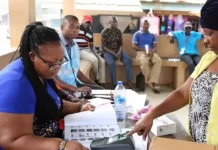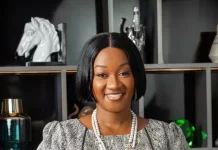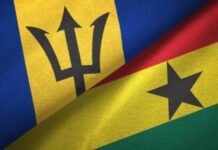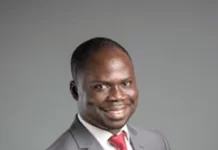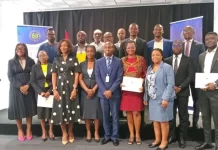
The Dean of the Business School at the University of Cape Coast, Professor John Gatsi, has stated that the International Monetary Fund (IMF) will make some critical demands of Ghana should the West African country return to them for support.
He said the IMF will request an audit into the Covid-19 spending by the government despite the Finance Minister Ken Ofori-Atta rendering an account in Parliament last week.
Speaking on the First Take show on 3FM Monday June 27, he said “Another thing IMF will demand from us is the #Covid19 expenditure audit and that could be a hindrance because it has not been done yet.
“What IMF will demand from us before the program is a new revenue conduit that the government has fulfilled by introducing E-Levy.”
His comments come at a time a leading member of the governing New Patriotic Party (NPP), Gabby Otchere Darko has said that in principle, he is not against the IMF programme.
Gabby explained that he is not for an IMF programme that gives the country peanuts but imposes conditions that will end up hurting the poor, jobs and businesses more.
In series of tweets on Monday June 27, he said “Am I against an IMF program in principle? No”
“I am not for an IMF program that throws peanuts at us but imposes conditions that will end up hurting the poor, jobs and businesses more. Covid-19 and War in Ukraine are not of Africa’s doing but more to our doom. A program that pretends it is all our doing is doomed to fail.”
“We do something that will inject confidence in our capacity to ride this heavy storm and that something should happen pretty quickly. Are you against an IMF program?”

Recently, the Chief Operations Officer at the Dalex Finance, Mr Joe Jackson said that Ghana needs to go back to the IMF.
It was his view that the country was not going to be able to resolve its fiscal challenges without going to the Bretton Wood institution for support.
Speaking in interview with TV3’s Komla Adom on the mid day news on Tuesday June 21, Mr Jackson said “I think the IMF is the most option to check the excesses we face.
“Our budget deficit is huge, there is no fiscal space, we need the IMF to support us so that the foreign markets and the flow of funds will be maintained. I honestly don’t see how we will get round this without going to the IMF.”
Another economist, Dr Adu Sarkodie also said recently that Ghana is likely to return to the IMF for support.
He said if this finally happens, it would affect some of government’s programmes such as the free Senior High School, Nation Builders Corps (NABCO) and others.
“We are likely to go back to the IMF. I don’t like it when we go there because of the conditionality. They may ask us to cancel Free SHS, NABCO, and all that but this is the time we need all these social interventions,” Dr Adu Sarkodie told 3FM on Thursday June 16.
The Finance Minister recently insisted that Ghana would not go back to the IMF for support.
In his view, the government has put in place measures including salary cuts and others, and also programmes to deal with the fundamental issues affecting the economy.
Mr Ofori-Atta said these when he was asked by expatriate journalist whether Ghana would consider going back to the IMF, at a press conference in Accra on Thursday May 12.
He said while answering the question that “All the white folks are just interested in us coming in the IMF programme. I always wonder why.”
“We are members of the fund; there are two major points of interventions that we have from the fund. One being the advise that we get because of the phenomenal expertise that the fund has and then secondly, these programme interventions which bring us some resources.
“I think, if you see from the budget that we constructed for 2022 and the subsequent announcement that we have done, clearly, the issue of Ghana having the capacity to think through the consolidation exercise exist. Also discipline itself with regards to the 20 per cent, etc, that we have shown clearly.”
He further indicated that “We have committed to not going back to the fund because in terms of the interventions and policy we are right there, the fund knows that we are completely in the right direction. The issue is, validating the programmes that we have put in place and then, in my view, supporting us to find alternative ways of financing or re-financing our debt, reprofiling it.”
3news









